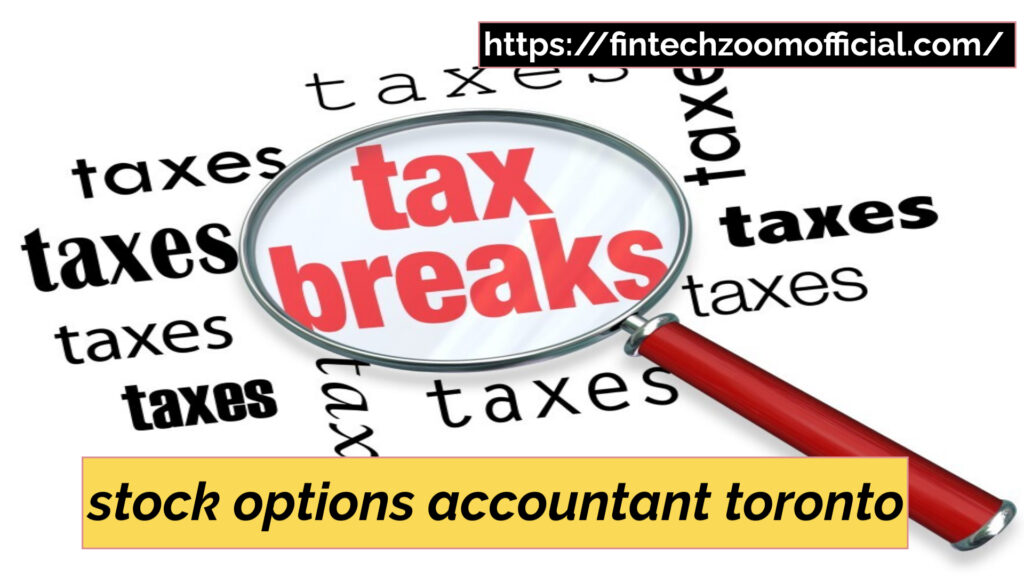FintechZoom.com | Your Gateway to Financial Insights
- Home
-
Stocks Updates
- News
-
Finance Tools
- Crypto Profit Calculator
- Savings Goal Calculator
- Compound Interest Calculator
- Currency Converter
- Tax Calculator
- Retirement Planner
- Net Worth Tracker
- Investment Portfolio Calculator
- Credit Card Payoff Calculator
- Monthly Budget Planner
- Mortgage Affordability Calculator
- Debt-to-Income (DTI) Ratio Calculator
- Fuel Cost Calculator
- Stock Return Calculator
- Loan EMI Calculator
- Latest Blogs
- Jobs Updates
Stock Options Accountant Toronto: 5 Essential Tips for Maximizing Tax Benefits

Table of Contents
Introduction
It is imperative for employees and employers alike to appreciate the treatment of stock options in the workplace, especially for a Stock Options Accountant Toronto, since it affects taxation considerably. In this quest, this guide will look into stock options in general but within the context of tax treatment of public companies and Canadian controlled private companies (CCPC) implications
Table of Contents
- Table of Contents
- Introduction
- Overview of Stock Options for Stock Options Accountant Toronto
- Importance of Tax Treatment in Financial Planning
- Distinctions Between Public Companies and CCPCs
- Key Points
- Definition of stock options accountant toronto
- Tax Implications
- Regulatory Changes
- Main Content
- What Are Stock Options?
- Tax Treatment for Publicly Traded Companies
- Grant Date Implications.
- Taxable Income at Exercise Date.
- Example Calculation.
- Capital Gains at Disposition Date.
- Capital Gain Considerations:
- Specific Tax Treatment Available for Canadian Controlled Private Corporations (CCPCs)
- Tax Calculation – A Practical Example
- Calculation of Taxable Income at Exercise for Public Corporations:
- Deferred Income Examples for CCPCs:
- Financial Reporting Requirements
- Government Restrictions Enforcement and Debate
- Risks Associated with Stock Options
- Seeking Professional Advice
- Questions and Answers
- What are the key differences regarding tax treatment for public companies and for CCPCs?
- How do I know how much of my stock options will generate taxable income?
- Are there some changes in legislation dealing with stock options accountant toronto?
- Conclusion

Overview of Stock Options for Stock Options Accountant Toronto
The primary objective of stock options is to provide a compensational rather than a ‘pay’ type measure in order to align employees performance to that of the company. In a way, it gives employees the right to acquire shares at a certain fixed price and this creates an incentive for the performance of the firm.
Importance of Tax Treatment in Financial Planning
One of the most critical aspects of stock options accountant toronto is their tax treatment which essentially modifies the net effect or income of employees and their financial planning. In this manner, such implications can efficiently assist in deciding the finances of an individual or a company.
Distinctions Between Public Companies and CCPCs
It is worth noting that financial results and policies change depending on some structural aspect of the said company and taxes hierarchy in place. Employees of publicly traded companies may apply other financial planning strategies than those employed by employees of CCPCs as there exists different taxation treatment on the employees.
Live Update: Current discussions on stock options in Canada are focusing on potential regulatory changes that could affect tax treatment for employees.
Key Points
Definition of stock options accountant toronto
stock options accountant toronto offer the employees a call up on a portion of the equity of the issuing company to the extent of a specified price referred to as the exercise price. It is usually incorporated into an employee’s pay as a bonus in order to motivate them to work towards increasing the worth of the business.
Tax Implications
There are significant differences in the way both taxable income and capital gain taxes are treated in publicly traded companies as opposed to CCPCs. It is important to appreciate these differences for purposes of tax planning.
Regulatory Changes
Recent welfarist government proposals were aimed at changing the way stock options accountant toronto are taxed, which has led to a controversy over the issues. It is also important to know about these changes as they relate to compliance and strategy.
Main Content
What Are Stock Options?
Stock options are a type of benefit that employees receive associated with the ability to buy shares of the company at a certain price, which is generally given during the grant of the options.
Definition and purpose of Stock Options: The stock options accountant toronto grant significant benefits to employees and thus makes them seem in line with shareholders interests. In a competitive environment, they are one of the components of the management’s promotion win or retention strategy.
Common Usage in Employee Compensation: stock options accountant toronto are such common elements of employment benefit plans and also retirement benefits in high technology firms, which growing firms and start up usually employ. This type of compensation works as an incentive and increases the level of motivation in the employee that improves corporate performance.
Tax Treatment for Publicly Traded Companies
The taxation policy surrounding the stock option is different for people who work for publicly traded companies as compared to those who work for a CCPC. It is critical to comprehend this treatment when a person makes attempts to understand their financial obligations as an employee.
Grant Date Implications.
Grant date tax implications for the employee unit are nil. This happens to be a critical point since employees at this point incur no tax liability due to receipt of the options.
Taxable Income at Exercise Date.
Employees acknowledge employment income as soon as they choose to use their(y) options. The taxable income relates to the excess of the market price of the shares on the exercise date over the exercise price.
Example Calculation.
An employee holding options exercisable at $10 but which fashionable capital market warrants $30 at operation, $20 earns as taxable incomes per share. This amount is also captured to the employee’s income for tax purposes and is subject to the employee’s income tax bracket range.
Capital Gains at Disposition Date.
After the shares have been disposed of, any profit emerging therefrom is tamed taxable capital gains. Capital gains taxes are levied on the profit obtained from the exercise as opposed to the fair market value at the time of sale.
Capital Gain Considerations:
If the option was exercised at $30 and the shares are sold at $40 then taxable capital gain of per share would be $10. This is charged to a gain arising on the sale results, which typically fall within the advantageous brackets of capital gains tax rates.
Specific Tax Treatment Available for Canadian Controlled Private Corporations (CCPCs)
There are tax incentives for employees of CCPCs that are not available to employees of other corporations, and this is appealing to many firms.
Grant Date Tax Implications for CCPCs: Just like employees who work for publicly traded companies, employees do not pay tax on the grant date. This structure allows the employees to get the best investment returns.
Deferred Income Recognition at Exercise Date: One of the benefits for employees working for CCPCs is the fact that employees can defer income recognition until the employees sell the shares. This deferral can be beneficial from the tax point of view.
Tax Deferral Advantage: Because income is not recognized until the shares are resold, employees would considerably reduce their taxes in the exercise year, thereby enhancing cash flow.
Capital Gains Taxation When the Shares are Sold: Gain taxes from the sale of shares are treated as capital gain taxes with a lower rate than normal income tax rates. This benefit makes them want to sell their shares less and than their interests would be in synchrony with the long-term success of the company.

Tax Calculation – A Practical Example
Taxation of stock options accountant torontos gives shareholders a better appreciation of how shares can cost. A few examples are here to see how tax liability can arise on a public company and CCPC.
Calculation of Taxable Income at Exercise for Public Corporations:
Example 1: Employee stock options accountant toronto granted have an exercise price of $14. Options are being exercised at a market price of $40. The taxable income is as follows: Market price – exercised price = $40 – $15 = $25 per share the employee has received after execution of 100 options whereas the taxable income remains at the same level of $25 * 100 = 2,500 dollars is taxable
Deferred Income Examples for CCPCs:
Example 2: Corporate Canadian Controlled Private Company (CCPC) employee’s sell their options at a recorded buy price of $20 where the market value is $50. Employee will not report income. If they then sell the shares for $60, only the capital gain of $10 or $60 -$50 will be subject to tax.
Financial Reporting Requirements
There are norms in accounting for stock optionsstock options accountant toronto that companies should comply with which affect the companies’ reports as well as their tax remittances.
Historical Report Context: In the past, there are several companies that did not show stock options under expenses. This lack of reporting posed problems regarding determining employee remuneration at a level which can be considered decent.
Current procedures are in place: Decide expense when it is incurred or when it is probed under the New standard for astronomical payments. All companies are well aware of the new public accounting standards where there is expense recognition of stock options more so IFRS 2. This expense recognition presents assessment on benefit of stock options accountant toronto to company management as it gives optimistic view on organization’s outcomes.
Government Restrictions Enforcement and Debate
The most notable developments revolve around the taxation of stock options, especially for those taxpayers with a high earning capacity.
A Brief commonly accepted norm On Proposed Bill on New mvc 6 slide:
In 2019, however, the Canadian government intended to introduce amendments to Canadian taxation which would restrict the amount of tax free stock options can be utilized by an individual earning more than $100,000. It was designed to address the issues of tax equity and revenue.
Restoration Procedures and Use of the Proposal and Documentation:
However, after strong opposition from industry stakeholders and the high tech industry the government abandoned the proposal. This controversy illuminated the need to ensure that there is a favorable treasury treatment on stock options for talent retention and acquisition.
Stock Options:
A Prized Long Term Retention Scheme for Employees: Stock options are an employee’s delight most of the time if they are designed right.
Aligning Employee Interests with Corporate Success: Stock options serve to make employees immensely involved in the growth and profitability of the firm since they stand to gain when the firm does well. This kind of alignment can be beneficial as it leads to better performance as well as creativity.
Financial Protection against Adverse Long-Term Effects on Employees: Successful stock options accountant toronto grants may be able to deliver very high monetary benefits whenever the share prices go up. For instance, employees who exercise options and retain their shares would be able to take advantage of significant positive price changes that will occur enhancing their financial well-being.

Risks Associated with Stock Options
There are opportunities provided by stock options accountant toronto but there are also risks that employees need to know as well.
Market Fluctuations Affecting the Value of Stock Options:
Changes in share prices greatly determine the worth of the options offered. An employee may find market conditions such that their options are underwater option (when the market price is lower than the exercise price), which will limit the financial advantage of the employees.
Tax Issues Which May Present Negative Unpredicted Outcomes:
Employees should know that there may well be reasons leading to them owing taxes at the point of exercise of the stock option. For example, an ill-specified share price can cause the expected tax benefit to exceed the actual tax benefit.
Seeking Professional Advice
Advice from experts allows compliance with tax regulations when dealing with stock options accountant toronto.
On When to Accept Advice from Tax Advisors:
Employees should seek professional advice when they wish to grasp their own tax circumstance, especially when exercising stock options. A competent tax advisor is able to help employees to incorporate tax minimization measures with respect to stock options accountant toronto.
Resources Available for Further Information:
There are a number of resources such as accounting firms, financial advisors and various web sources that would be helpful in stock options taxation and related financial matters.
Questions and Answers
What are the key differences regarding tax treatment for public companies and for CCPCs?
In public companies there is tax on income bringing as a result shares being exercised, but in CCPC income is not taxed until the shares are sold. The fact of the matter is that in any case through putting this difference there is remarkable changes in the tax burden and cash flow for the employees.
How do I know how much of my stock options will generate taxable income?
For every taxable income in respect of options issued to employees, tax is computed as a variation from the market value of shares that existed at the exercise date and those that are counted as payments for the option depending on the set rules. At the exercise date for public companies those who bought shares with options and sold immediately would have received income on their options. In the case of CCPCs there are provisions that such income shall not be recognised until the shares are disposed off.
Are there some changes in legislation dealing with stock options accountant toronto?
Yes, there were attempts to make changes in 2019 that were intended to change the taxation of stock options accountant toronto; however, these suggestions were very controversial and withdrawn. It is worth noting that it is important to keep up with changes in law in order to plan finances appropriately.

ALSO READ THIS BLOG : FINTECHZOOM UBER STOCK: PROMISING INSIGHTS AND ANALYSIS FOR 2024.
Conclusion
It is worth noting that knowledge on stock options in Canada is necessary in achieving proper tax planning.
Again, recapitulate the major issues brought up in the course of this blog discussion, particularly the divergence in taxation and the need for seeking professional help.
Illustrate that employees have to be listening out for regulatory changes, as such changes may be of consequence to employees and how they plan their finances.
Suggest that general advice is good enough, so that stock options accountant toronto do not become a difficult concept for employees to cope with.
There is no doubt thatstock options accountant toronto will always find themselves in scenarios that could be quite challenging especially for most employees especially when there is no adequate information or support. However people should be looking at optimizing their benefits such that the available tax implications are fully addressed by them.
These proposals weremostly focused on improving employee tax treatment of options or changing tax policy related to the exercise of these useful employee benefits.
Employees have to be paying extra effort in understanding in what it revolves, understanding, reporting and paying upon the exercise of incentive stock options accountant toronto.













No Comments